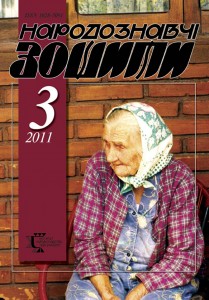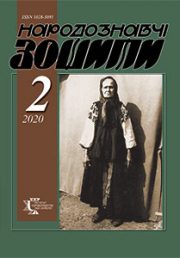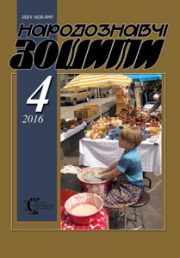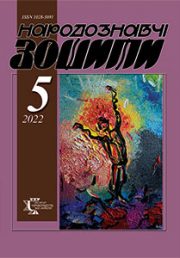
Content
Pavluk Stepan. Global catastrophe at Chornobyl Nuclear Power Station. P. 371-379
From 25-years-long distance that elapsed since the time of technogeneous catastrophe at Chornobyl Nuclear Power Station an evaluation has been given of scientific activities by Ukrainian scholars as for preservation of material and spiritual culture in Polissia regions. Attention has been paid to a role realized by staff members of the Ethnology Institute, NAN of Ukraine in studies on phenomena of Polissians’ traditional folk culture, so in lands spoiled by radiation as in displacement asylums. On the ground of strict factual data the unique character of such a complex scientific works as Classifier for introduction of unified system in classification and coding of objects of Ukrainian Polissia’s etnical heritage, Dialects of Chornobyl zone has been disclosed as well as some features of scientific monographs, collections of papers and resource databases on cultural heritage of Ukrainian Polissia.
Keywords: Chornobyl Nuclear Power Station, Polissia, alienation zone, material and spiritual culture, classifier.
read »
Vasyl Sokil. Non-verbal means of expression in the narratives about the famine. P. 380-390
The article describes the nature of non-verbal means of expression — mime, gestures, acoustic communication means, and ways of apprehensibility of the text (intonation, rhythm, pauses). It is illustrated by valuable video-ranges that supply us with a base to speak about folklore text as a living and creative organism.
Keywords: folklore text, non-verbal means, mime, gesture, intonation, pause.
read »
Pastukh Nadija, Kharchyshyn Olha. On ukrainian folklore as a factor of ethnical identity in Ukrainians of republic of Moldova. P. 391-400
In the article have been touched some problems related with ethnical development and identification of Ukrainians populating the North Moldovan regions. On the basis of their own field studies as for contemporary folkloristic tradition in Ukrainian villages of Moldova during 2005 to 2009 the authors have confirmed true genetic tie of local inhabitants with Ukrainian people and but consider the folklore as one of most important factor of ethnical identification and ethnical unity.
Keywords: folklore, identity, assimilation.
read »
Hilevych Ihor. On «Regional historical and ethnographic atlas of Ukraine, Byelorussia and Moldova» in view of field explorations in Ukraine (mid-1960s to early 1970s). P. 401-412
In the article are considered some preparatory works to Ukrainian ethnologists’ most important scientific project of postwar period, a study themed as Regional Historical and Ethnographic Atlas of Ukraine, Byelorussia and Moldova. On the basis of analytic research in quite a wide range of used archived and literary sources certain peculiarities of this scientific project as well as its geography, methods and results of field explorations across then-a-day Ukrainian territories have been presented and characterized.
Keywords: ethnology, Ukraine, atlas, field explorations, methods.
read »
Koval-Fuchylo Iryna. On present state of genre variety in folklore of Sumy region. P. 413-418
In the article have been presented and analyzed a nowadays situations in functioning of traditional folklore beliefs and activities by population of Lebedyn district, Sumy region of Ukraine. The study is based upon some data found and gathered by author in August 2008. Calendar, house and homestead rites and customs as well as local peculiarities in functioning of lyrical songs and magical practices have been described.
Keywords: Sumy region, Ukraine, folklore, calendar, house and homestead rites and customs, magical practices.
read »
Yagelo Svitlana. Spirits as landlords of natural loci in demonological prose of Carpathians. P. 419-425
The article brings analytic studies in folklore materials, revealing a state of preservation of demonological prose on feminine images (nyavka, bisytsya, wild grandmother, perelesnytsya etc.). Main attention has been paid to appearances, functions and semantics of those characters and their impact on human life. Characteristics have been given of general subjective and motive-presenting stock of demonological stories from Carpathian region with definition of peculiarities in mentioned personages.
Keywords: demonology, demonological image, character, meaning, function, motive, plot.
read »
Bryniak Oksana. On remnants of mythological beliefs in ukrainians’ natal ritualism and baptismal poetry. P. 426-435
The article presents an attempt to discover some traces of Ancient Slavs’ Pagan cults of worshiping toward mythological deities and related with those certain natural objects, to define rudiments survived in ritual acts and verbal accompaniment in forms of spells and wishes as well as in baptismal chants. Symbolism of natal ritualism and baptismal poetry has been thoroughly analyzed. Relics of Ancient Slav world-view with subsequent Christian layers and corresponding socio-historical circumstances have been recreated.
Keywords: water, fire, herbs potion, porridge, pitcher, protectress, progenitress, Rod stock, stork, crane, smith as demiurge.
read »
Bolibruкh Lina. On scientific concepts as for origin of wedding round loaf in eastern slavs. P. 436-447
The article brings some characteristics of scientific concepts as for the origin of wedding round loaves in Eastern Slavs realized in series of studies by researchers of the second half XIX to early XXI cc. In particular, author’s attention has been paid to conceptions and hypotheses presented by leading scientists as Olexandr Potebnya, Mykola Sumtsov, Khvedir Vovk, Hrysanf Yaschurzhynsky, Lev Sternberg, Mykola Nykolsky, Albert Bajburin and others. By means of analytic studies in factual materials there had been found main gaps in proposed conceptions and forwarded a research tasks concerning holistic and comprehensive disclosure of the scientific problem as for origin of wedding round loaf.
Keywords: ethnology, eastern Slavs, round loaf, conceptions of origin, gaps.
read »
Pukivskyy Yuriy. On traditions of pre-marital interrelations in the youth of volhynia (according to materials of spring cycle at traditional folk calendar). P. 448-455
In the paper have been considered some traditions of pre-marital interrelations known in Volhynia land during XX c. It has been stated that certain customs of spring cycle of traditional folk calendar had in fact been quite peculiar forms of youth’ leisure. By use of his own field ethnographic materials the author investigates the structure and special features of ritual mutual relations of the unmarried youth in different parts of ethnographic Volhynia. An attempt has been made to determine their functional roles and symbolic meanings.
Keywords: pre-marital interrelations, traditional folk calendar, Volhynia, customs, youth’ games.
read »
Wasilewski Jerzy S. An ethnologist’s problems with globalization: is one to believe in it, how is it to be studied, how to speak about it? P. 456-464
Some events of recent years, as financial world crisis and descended from it economical one — both accompanied by their inevitable social consequences — one more time present us with an opportunity to conceive that there is rather small exaggeration in globalization scholars’ notion: in the framework of this process something that happened yesterday in New York now has strong hold over situation at Nowa Huta and will have effect on tomorrow life in New Guinea. Such intimidating situations mobilize us to think on proportions still being left for positives and negatives within this dominating tendency of the present. Representatives of social and cultural anthropology as well as those of other humanitarian sciences make debates on mechanisms and consequences of global transformations causing homogenization and differentiation and try to make a balance of profits and losses brought by this process into local cultures.
Keywords: globalization, global consciousness, transposition of humans, capital means, Internet , local cultures
read »
Mahas Halyna. On traditional motifs in Christmas carols nd epiphany benevolent chants of Stryj region: all-ukrainian context. P. 465-475
In the article has been considered a system of traditional motifs still present in Christmas carols and Epiphany benevolent chants of Stryj region. Main accent has been laid upon laudatory and well-wishing motifs, as such subject-creating elements belong to key points in the context of winter calendar ritual poetry of Stryj land.
Keywords: Stryj, folklore, traditional motif, magnification, suggestions, idealization.
read »
Koval Halyna. On floristic symbolic code of ukrainians’ traditional calendar poetry. P. 476-481
In the article is considered a floral code being predominating issue of traditional folk calendar songs. The research-work has brought a model of code system correlated to floral world. Special attention has been paid to certain vegetative processes and household works that had become quite significant ones as well as to symbolic situations so on the verbal level (a song) as on nonverbal one (a ceremony).
Keywords: code, symbol, image, folklore, song.
read »
Sokil-Klepar Nataliya. Concept of «mountain» in the microtoponymy of Ukrainian Carpathians. P. 482-488
The concept of «mountain» in the Carpathian microtoponymy has been analyzed in the article. The meaning as well as linguistic means of expression have been considered, presentation of folk etymology as for onyms has been added.
Keywords: microtoponym, geographic term, relief, oronym.
read »
Sokil Hanna. On Galicia in Myroslav Kapiy’s and Volodymyr Levynsky’s foklore studies. P. 489-496
Myroslav Kapiy’s and Volodymyr Levynsky’s names are rather less known to wide public inspite the fact that those researches had made quite a significant contribution into Ukrainian science. Their folklore notes and recordings from Galicia had became a lot of valuable data to Shevchenko Scientific Society’s editions of late XIX and early XX cc. and archival stores that enabled the possibility to expand understanding of the region.
Keywords: folk recordings, Galicia, region, folk songs, variants, motives.
read »
Chupashko Ivan. On Yevhen Vakhnyak’s and Volodymyr Vasylevych peculiarities of executive artistry. P. 497-502
In the article have been analyzed some peculiarities in individual executive styles by Yevhen Vakhnyak and Volodymyr Vasylevych, representatives of Lviv school of conductorship. On the basis of own observations and contemporaries’ memoirs an attempt has been made to trace the sources for settling of Vakhnyak’s and Vasylevych’ executive styling as well as to systematize their characteristic features.
Keywords: choir art, Lviv school of conductorship
read »
Sodomora Khrystyna. On correlation of traditional and innovatory features in artistic projects of men’s decorations by ukrainians of Carpathian region. P. 503-508
In the article has been considered a problem of traditional and innovatory artistic approaches as principal theoretic notions at the research-works on artifacts of decorative art. A series of debatable items concerning the mentioned points have been discussed and exemplified by findings of scholars in folk artistry. Practical realisation of their concepts might be presented by professional artists’ creative works. Among those have been analyzed creations by eminent brass-craftsman Roman Strynadyuk, as well as certain graduates from the department of artistic metal at Kosiv Academy of Arts and Crafts and Vyzhnytsia College of Applied Arts.
Keywords: tradition, innovation, folk art, brass-craftsman, buckles, cheprahas protectors, pipes, crosses.
read »
Dudarets V., Smolyar О. Some principles in formation of Eastern stony gardens. P. 509-516
In the article have been studied some principles in formation of Eastern stony gardens as well as the kinds of ones and the roles in creation of landscape compositions
Keywords: stony gardens, garden art, garden types, garden styles, landscape composition.
read »
Bilous Vira. On caucasian studies in Kornylo Ustyianovych’ heritage. P. 517-527
The article throws light upon a less-known contribution made by artist and writer K.Ustyianovych into Caucasian Studies. Based on a manuscripts, the article has reflected some underlying reasons and character of his interest in ethnical history of Caucasian peoples as well as evaluation of his works “Caucasus”, “Kolhis” and “Ararat” as for history of appearance and the scientific and informative contents of those.
Keywords: K.Ustyianovych, Caucasian Studies, ethnogeny, history and ethnology of the Caucasian peoples
read »
Kharchuk Khystyna. Hill of glory (Horb Slavy) — russian military graveyard of 1914s — 1915s. P. 528-531
The article examines a problem as for foundation of Russian military cemetery of soldiers fallen during 1914s-1915s, still considered to be historical, memorial and cultural heritage of Western Ukraine. This cemetery appeared in Lviv after I World War.
Keywords: military cemetery, cultural heritage, Western Ukraine, I World War.
read »
Nadopta Andriana. Nun Severyna Parylle’s (order of St. Basil the Great) activities for preservation of artifacts by Ukrainian culture. P. 532-542
In the article author has brought analysis of nun Severyna Parylle’s zealot efforts for preservation of Ukrainian cultural monuments. The work has been focused upon the gathering and exhibitive activities led under the aegis of a museum established by S. Parylle at Basilian gymnasium in Lviv. An attempt has been made to discover the role of museum and its significance in establishment of Ukrainian ethnographic practice in Galicia at the studied period.
Keywords: nun, value, exhibitions, museum, ethnographic collection.
read »
Fedorus’ Mariya. Jordan festival on the lake shore near Vereshchytsia, Yavoriv land. P. 543-544
read »
Sapelak Oksana. Argumentative, competent reasoning… P. 545-548
read »
Balahutrak Mykola. Continents of Ukrainian identity. P. 549-551
read »
Dyakiv Volodymyr. First monographic historio-folkloristic study on Yakiv Novytsky. P. 552-555
read »








